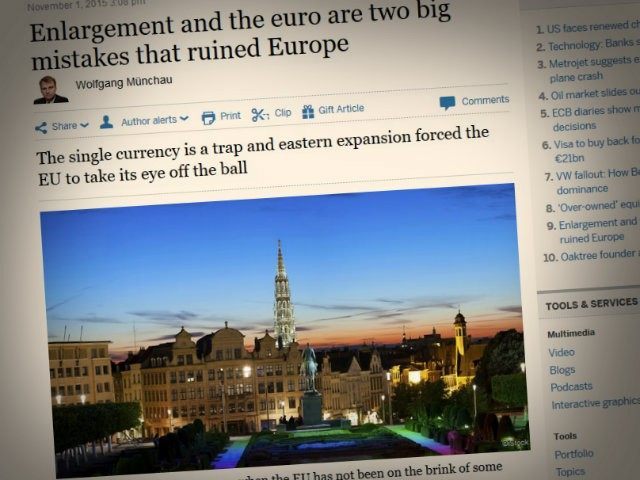The European project has been ruined by the two “catastrophic errors” of creating the euro currency and then expanding the European Union (EU), a respected EU analyst has written.
Wolfgang Münchau, a Financial Times columnist who once championed further EU integration, acknowledges that his initial support for the euro was a mistake and that the EU expanded east far too quickly, meaning it could not absorb the “shocks” of the financial crisis.
I was among those who supported monetary union at the time of its introduction. Advocates of the euro at the time came from two different groups, who struck a Faustian Pact.
Members of the first group believed the euro as constructed would fail, and hoped it would somehow be fixed. The others thought the system would stay rigid, and bend the economies of its members into a new shape. This latter group knew that, to withstand the rigours of a fixed-exchange system that resembles nothing so much as the gold standard, countries would have to adjust to economic shocks through shifts in wages and prices — a course, they believed, that the euro’s members would be forced to take.
The effects of this naivety were made even worse with the incorporation of 13 new states within the space of a decade.
Enlargement affected Europe’s ability to respond to the shocks of subsequent years in two ways. First, it forced the EU to take its eye off the ball at a critical time when it should have focused on building the institutions needed to make the euro work. Second, enlargement meant that EU countries that were not in the eurozone suddenly found themselves in the majority. That shift naturally shaped the EU’s own agenda. I recall the obsession during those years with competitiveness, a typical small-country economic issue. Debates on the reform of Europe’s treaties during those years focused on voting rights and the protection of minorities. It was the overwhelming view of European officials and members of the European Parliament that the eurozone itself did not need to be fixed.
Mr Münchau, who also runs the Eurointelligence website, then explodes the myth that the EU created half a century of peace on the European continent, admitting that until the 1990s “the external security risks were taken care of by Nato.”
The European Economic Community, as it then was, was also able to deal with the economic crises of the 1970s through flexible exchange rates, something not possible under the euro.
Today Brussels suddenly has to look after its own foreign policy interests and run the world’s second-largest economy. The EU is not institutionally ready for either job. And its leaders are intellectually not ready either.
Mr Münchau reaches a conclusion that should make all fans of the European Union despair:
We should expect to see more crises, more unilateral action by member states, greater willingness to explore opt-outs, invocation of exceptional circumstances to suspend EU-level action, more rule breaking and the like.
The real risk is not a formal break-up. That would be technically hard to do. But this is no consolation. The real danger is that the EU is simply going to wither away and turn into a ghost.

COMMENTS
Please let us know if you're having issues with commenting.